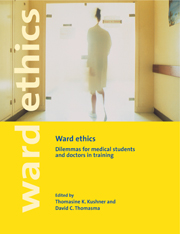Book contents
- Frontmatter
- Contents
- Acknowledgments
- List of contributors
- Prologue. Breaking the silence
- Letter from a young doctor
- Part I On caring for patients
- Section 2 Problems in truth-telling
- Section 3 Setting boundaries
- Part II On becoming a “team player”: searching for esprit de corps and conflicts of socialization
- Section 5 Argot, jargon, and questionable humor: assuming the mantle at the patient's expense
- Section 6 Making waves: questioning authority and the status quo
- Section 7 Perceiving misconduct and whistle-blowing: observing peers or superiors commit an act deemed unethical
- Epilogue: Using this book
- Glossary
- Index
Section 2 - Problems in truth-telling
Published online by Cambridge University Press: 05 February 2015
- Frontmatter
- Contents
- Acknowledgments
- List of contributors
- Prologue. Breaking the silence
- Letter from a young doctor
- Part I On caring for patients
- Section 2 Problems in truth-telling
- Section 3 Setting boundaries
- Part II On becoming a “team player”: searching for esprit de corps and conflicts of socialization
- Section 5 Argot, jargon, and questionable humor: assuming the mantle at the patient's expense
- Section 6 Making waves: questioning authority and the status quo
- Section 7 Perceiving misconduct and whistle-blowing: observing peers or superiors commit an act deemed unethical
- Epilogue: Using this book
- Glossary
- Index
Summary
Truth-telling is a major feature of physician– patient interactions. On the one hand, professionals must tell the truth so that patients can adequately make decisions about their health care. On the other, patients must have sufficient trust in the relationship to give accurate and forthright responses to their doctors. In this section some of the complexities of truth-telling are raised. Questions about the appropriateness of disclosing information only arise when there is some sort of psychological resistance to disclosing a particular kind of information. What are the limits of disclosure? Is misleading through dissembling and obfuscation justifiable?
- Type
- Chapter
- Information
- Ward EthicsDilemmas for Medical Students and Doctors in Training, pp. 79Publisher: Cambridge University PressPrint publication year: 2001

